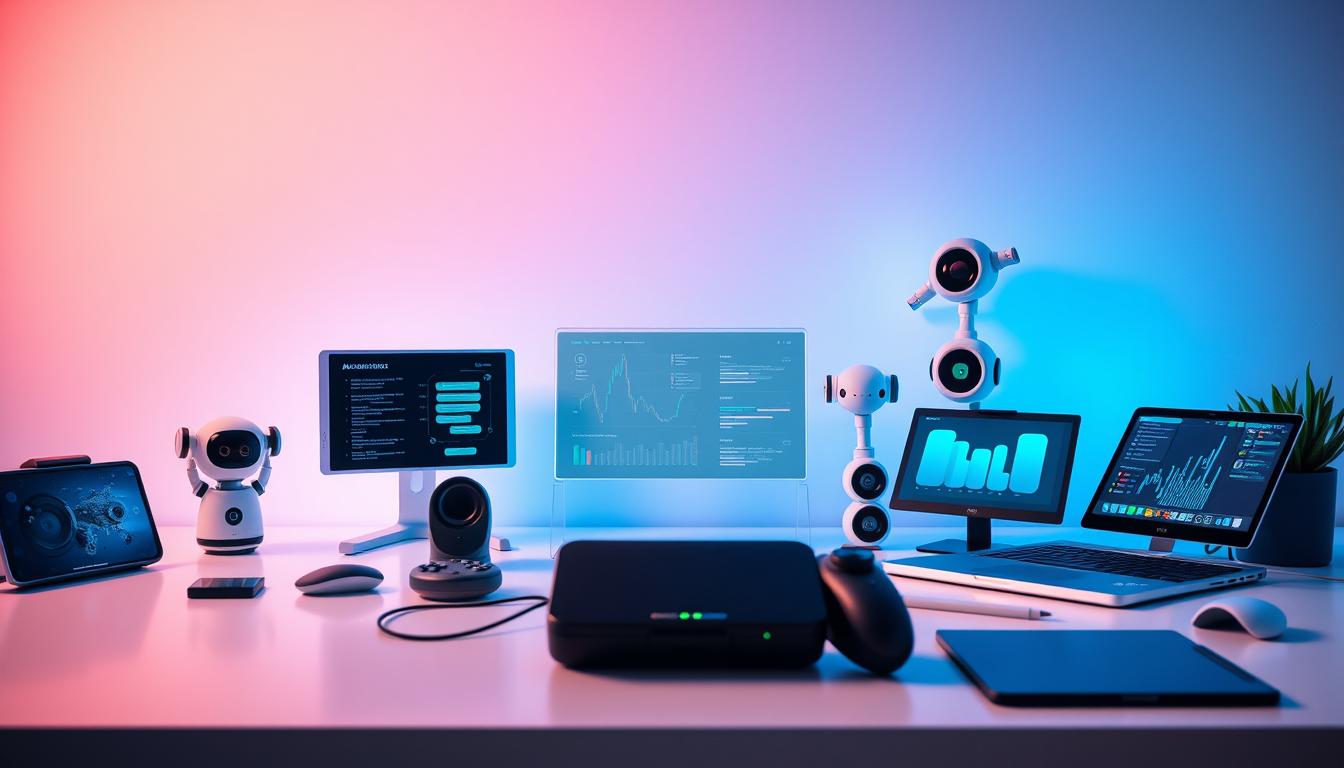Are you a small business owner finding it hard to keep up with new tech? AI tools are here to change how you work. They can make your customer service better and help with marketing and sales. But which ones are the best?
In this article, we’ll explore the top 10 AI tools for small businesses. You’ll see how these advanced solutions can improve your operations. They can also make your business more productive and competitive.
Key Takeaways
- AI tools are changing small business operations in customer service, marketing, sales, and productivity.
- ChatGPT, once a worry for writers, is now a great research tool.
- AI offers 24/7 customer support, boosts content quality for 90% of marketers, and helps in sales for 86% of professionals.
- More than 60% of business leaders have invested in AI. It has made 72% of employees more productive.
- Tools like HubSpot, Buffer, and Grammarly provide solutions for many business needs. They help with CRM, social media, and writing.
Understanding AI’s Impact on Modern Business Operations
AI business software is changing how small businesses work across many fields. Retail, healthcare, finance, and manufacturing are seeing big changes because they use a lot of data and automation. Small businesses can start by using AI for customer service, like chatbots. Then, they can add AI to other areas like marketing and managing supplies.
Current State of AI Adoption in Small Business
More and more small businesses are using AI technology. They use AI to make their work easier and more efficient. AI helps in many ways, from understanding language to creating images, changing how businesses talk to customers and make choices.
Key Benefits of AI Implementation
Using AI business software can save time and improve customer service with chatbots. It also helps businesses make better decisions with data. AI can understand and respond to text, create videos, and analyze images for things like ID checks.
Common Challenges and Solutions
While AI offers many benefits, small businesses face challenges like data privacy and job loss. There are risks like data privacy issues and jobs being replaced. But, AI can also open up new jobs in tech and AI management.
To overcome these challenges, businesses should pick AI tools that fit their goals. They should look for tools that are easy to use, affordable, reliable, and secure. With AI-as-a-Service platforms, all businesses can use AI, no matter their size or budget.
“The integration of AI-driven small business technology is steadily gaining momentum, with companies leveraging the power of artificial intelligence to streamline their processes and enhance overall efficiency.”
Essential AI Tools for Customer Service Enhancement
In today’s digital world, AI is changing how small businesses talk to their customers. AI chatbots and virtual assistants are key for better customer service and satisfaction. They make responses faster, give accurate answers, and offer personalized experiences.
Zia by Zoho CRM automates tasks like lead data entry and sales forecasting. It works with websites and social media, answering customer questions quickly. Jasper AI also helps by understanding the context and feeling behind customer inquiries, making responses more personal and efficient.
These tools provide 24/7 support, sort tickets, and send them to the right people. This makes customer service better and agents more efficient. In fact, 71% of customer support specialists say AI tools improve customer experience. And 78% think AI makes them more efficient.
| AI Tool | Pricing |
|---|---|
| Velaris | Pricing available upon request |
| Freshdesk | Free plan and pricing tiers starting from $14.35/agent/month |
| Kustomer | Enterprise plan at $89/month/user and Ultimate plan at $139/month/user |
| Tidio | Free plan and pricing starting from $29/month |
| Zoho Desk | Free plan and pricing tiers starting from $15.55/month/user |
| Intercom | Essential at $39/month/seat, Advanced at $99/month/seat, and Expert at $139/month/seat |
| Zendesk | Varied pricing models, including Support team at $19/month and Suite plans starting from $55/month |
| Nextiva | Pricing starts from $18.95/user/month |
Using AI-powered customer support and chatbots for small business helps companies improve service. It boosts efficiency and increases customer satisfaction and loyalty.
“AI-powered tools can handle a higher volume of queries without compromising quality, as per HubSpot’s findings.”
AI-Powered Marketing and Sales Solutions
Modern businesses can now make their marketing and sales better with AI. AI tools help with content, lead generation, and social media. This makes it easier for companies to reach their audience.
Content Creation and Optimization
Tools like Copy.ai and Jasper AI help create great content for marketing. They use AI to make content that speaks to customers.
Lavender.ai also makes content better. It uses AI to check and improve content’s quality and fit.
Lead Generation and Nurturing
AI is key in sales now, making lead generation better. AI helps find the best leads, making sales more efficient.
Tools from Salesforce, HubSpot, and Amazon predict which leads will convert. This helps in nurturing leads and reaching out effectively. But, it’s important to keep a balance between AI and personal touch for a good customer experience.
Social Media Management Tools
Buffer uses AI to plan and post social media content. It looks at what users like to suggest the best content and timing.
Using AI in marketing and sales improves customer interactions and efficiency. It helps companies perform better overall.

| AI Marketing Tool | Key Features | Benefits |
|---|---|---|
| Copy.ai | – Content generation – Copywriting assistance |
– Streamlined content creation – Improved brand voice consistency |
| Lavender.ai | – Content optimization – Readability analysis |
– Enhanced content effectiveness – Improved customer engagement |
| Buffer | – Social media scheduling – Audience analysis |
– Efficient social media management – Increased social media engagement |
“AI-powered tools offer unprecedented automation in marketing strategies, helping businesses streamline their operations and unlock new growth opportunities.” –
By using AI in marketing and sales, companies can better serve their customers. This leads to more efficiency and growth.
Technology Integration for Business Productivity
AI tools have greatly improved productivity in small businesses, changing how they work. Tools like Notion AI make organizing, working together, and managing projects easier. ClickUp AI helps with writing, translating, and coming up with new ideas. These tools automate routine tasks, letting employees do more important work.
It’s key to link these AI tools with what you already use to get the most out of them. Cloud-based tools let teams work together in real time, no matter where they are. Tools like Zapier or Microsoft Power Automate take care of boring tasks, cutting down on mistakes and giving more time for important work.
Tools for managing projects, video calls, and learning online also help a lot. They make workflows smoother, help teams work better together, and keep skills sharp. All-in-one platforms that bring different apps together make work even more efficient.
Using advanced analytics and inclusive tech helps businesses make better choices and use resources wisely. It ensures everyone can do their best, leading to better productivity and happiness at work.
“Morale and the sense of community improved significantly after integrating their technology into workflows for a 100% remote company.”
AI tools and tech have changed how small businesses work, making things more efficient and freeing up time for important tasks. By using these new solutions, small businesses can reach new heights of productivity and success.
AI Tools for Financial Management and Analytics
In today’s fast-changing digital world, AI tools are changing the game for small businesses. They automate boring accounting tasks, offer predictive financial insights, and help manage budgets. This lets entrepreneurs make better choices.
Automated Accounting Solutions
Tools like Plus.AI make reporting and analytics easier. They pull out important data insights and create detailed financial reports. This frees up small business owners to focus on big goals and avoid common accounting mistakes.
Predictive Financial Analysis
Platforms like Upmetrics use AI to forecast finances accurately for small businesses. They look at past data, trends, and market conditions. This helps entrepreneurs plan for the future with confidence.
Budget Optimization Tools
Tools like Booke.AI and Vic.ai help small businesses manage their finances better. They automate budget tracking, forecasting, and expense management. This lets entrepreneurs make smart financial decisions and use their resources wisely.
AI is changing how small businesses handle finances and analytics. It gives them the tools and insights they need to succeed in a tough market.
“AI-powered financial tools are not here to replace finance professionals, but to enhance their capabilities and allow them to focus on strategic decision-making.” – Industry Expert
Creative and Design AI Applications
In the fast-changing world of AI, small businesses find new tools for creativity and design. AI design tools and creative AI for small business change how entrepreneurs make visual content and products. They also help in creating interactive apps.
DALL-E, made by OpenAI, is a game-changer. It makes images from text, helping small businesses make stunning artwork and marketing materials easily. Bricabrac AI also lets users make web apps, games, and tools without needing to code.
AI design tools can change how small businesses do creative projects. They use AI to make high-quality content, design new products, and create apps affordably. This helps them improve their brand, connect with customers better, and keep up with rivals.
“Portrait of Edmond de Belamy” sold for $432,500, showing more people value AI art. Generative AI has changed art, music, and sculpture. It can even make 3D models for sculptures that can be printed. This mix of AI and creativity opens new chances for small businesses.
As creative AI for small business grows, entrepreneurs must use these tools to stay ahead. By using AI for design and creativity, small businesses can reach their full potential and succeed online.

Adding AI tools to creative and design work is a big change for small businesses. AI design tools and creative AI for small business let entrepreneurs innovate, strengthen their brand, and attract their audience. As AI gets better, small businesses have endless chances to use AI in their creative work.
AI-Powered Project Management Solutions
AI is changing how small businesses manage projects. AI project management tools like ClickUp, Notion, and Taskade make workflows smoother. They also help teams work better together and understand project success better.
Task Automation Features
AI tools automate boring tasks, giving teams more time for important work. ClickUp’s AI assistant can come up with ideas, summarize documents, and plan tasks. Notion’s AI helps organize content and ideas smartly.
Team Collaboration Tools
Team collaboration software like Fellow and Clockwise makes talking, sharing files, and tracking tasks easier. They use AI to improve meeting plans, take notes, and show how productive the team is.
Performance Tracking Systems
AI tools in Asana and ClickUp give detailed reports on project progress and team work. These insights help small business owners make better decisions to boost efficiency and reach their goals.
Small businesses can make their operations smoother, teamwork better, and get insights to succeed with AI project management tools.
Security and Data Protection in AI Tools
Small businesses are using AI tools more often. This raises big concerns about data security and protection. It’s key for business owners to check data usage agreements carefully. This ensures their data is not misused.
Strong security steps like encryption and access controls are vital. Regular audits and training on data protection help reduce risks. This keeps data safe and builds trust with customers.
Before diving into data protection, it’s important to set ethical AI usage rules. Avoiding the use of sensitive data in generative AI can lower breach risks.
Working with big tech providers can boost data protection. They offer encryption, access controls, and monitoring to fight security threats. Techniques like data masking and pseudonymization help protect data in AI use cases.
It’s crucial to balance openness with privacy in AI systems. Key strategies for data protection in AI include ethical guidelines, data avoidance, security measures, transparency, and teamwork with tech providers.
AI in data collection poses privacy risks. It’s important to balance tech progress with protecting personal info. Laws like GDPR and CCPA aim to safeguard data privacy and ensure clear data handling practices, shaping AI development.
| Data Collection Method | Description |
|---|---|
| Web Scraping | Automatic scanning of websites and social media platforms to collect specific information. |
| Sensor Data | Data collected from devices like smartphones, fitness trackers, and smart home gadgets, providing a continuous stream of information for AI analysis. |
| User Data | Tracking data from apps and websites to enhance AI systems’ capabilities in providing personalized suggestions and services. |
| Crowdsourcing | Engaging people to assist AI in learning specific tasks or labeling data for training. |
| Public Datasets | Datasets shared by researchers, companies, governments, and online communities to advance AI technologies in different fields. |
| Data Partnerships | Collaborations between companies to share unique datasets for enhanced AI development. |
| Synthetic Data Generation | Using AI techniques to create artificial data when real-world data collection is not feasible. |
AI’s role in data collection brings privacy challenges. These include data misuse, biased algorithms, unclear AI operations, surveillance, and the risk of data breaches.
“Balancing the benefits of AI-powered tools with the need for robust data security and privacy protections is crucial for small businesses to unlock the full potential of these transformative technologies.”
Conclusion
The future of AI in small business is exciting. It can make operations better, improve customer service, and increase productivity. Small businesses can use AI for many things, like chatbots, financial analysis, and design tools. This gives them an edge over competitors.
But, using AI tools right is key. You need to think about what your business needs, how to integrate AI, and keeping data safe. The Emerging Technologies Trend Report shows how AI can help small businesses. It can make processes smoother, improve user experiences, and boost productivity.
By using AI wisely, small businesses can innovate and make better decisions. They can work more efficiently in many areas. As technology keeps changing, small businesses that use AI will do well in the market.



